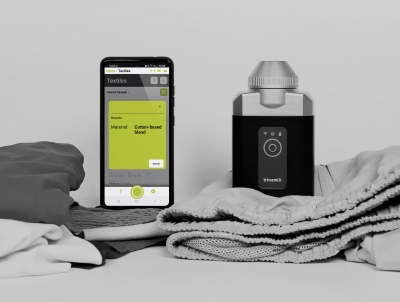The solution includes easy-to-use hardware with intelligent data analysis, an intuitive app for fast results, and an extensive customer portal where in-depth analyses and reports can be created

trinamiX, a leading provider of mobile spectroscopy and a wholly owned subsidiary of BASF SE, now enables flexible on-site identification of textiles.
With trinamiX’s Mobile NIR Spectroscopy solution, more than 15 textile types and compositions can now be identified and thus better sorted. Even pieces made of material blends can easily be determined without damaging the material. The solution includes easy-to-use hardware with intelligent data analysis, an intuitive app for fast results, and an extensive customer portal where in-depth analyses and reports can be created.
trinamiX thus opens up new ways for customers from the textile industry to exploit additional potential in the field of textile recycling. Textile collection companies and organizations are equipped with an efficient tool that enables them to pre-sort goods according to quality and next processor.
Recycling companies can improve the quality of the recycling process by continuously checking incoming goods. Textile manufacturers also benefit from mobile textile recognition: they can use spot-measurement at goods receipt to check if the delivered textiles are in conformity with the ordered quality.
"We are convinced that innovative solutions like ours make an important contribution towards a circular textile economy," explains Adrian Vogel, Business Development Manager, trinamiX GmbH.
"Sorting is a key requirement for recycling and is largely done manually. Even experienced sorters cannot tell the difference between, for example, nylon 6 and nylon 6.6 just by looking at it or feeling it. This is where the handheld solution from trinamiX provides clarity," added Vogel.
The solution supports a wide range of common textile grades used in clothing, furniture and household goods, for example: acrylic, cotton, nylon 6/6.6, polytrimethylene terephthalate (PTT), polyester, polypropylene (PP), silk, sisal, viscose, and wool. Textiles made from more than one material can also be identified. These include blends based on acrylic, cotton, nylon, polyester, silk or wool.
Subscribe to our newsletter & stay updated.